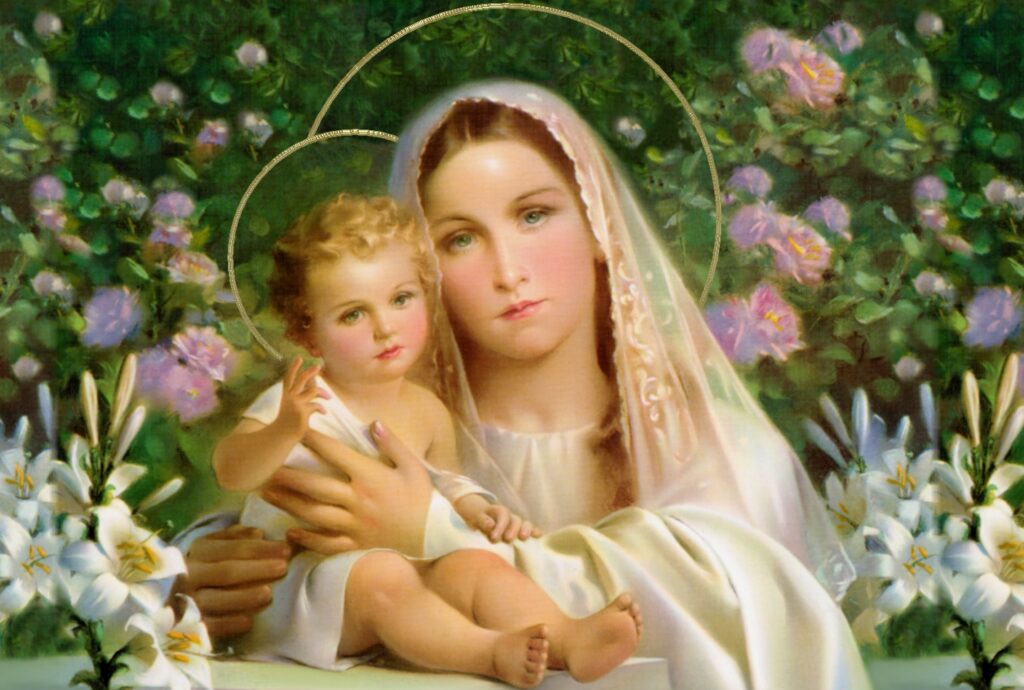Welcome to Free Rosary Book, your ultimate resource for understanding and appreciating the beauty of the Rosary. We recognize that the Rosary can seem complex or intimidating to some, which is why we’ve created a comprehensive guide to help you navigate this profound devotion.
Join Us to Pray the Holy Rosary Online or Scroll Below for the Rosary Book
The Rosary is a form of Christian prayer that invites us to meditate on the mysteries of the life of Jesus Christ, guided by the rhythm of its prayers. From the Joyful Mysteries to the Luminous, Sorrowful, and Glorious Mysteries, each aspect of the Rosary offers a unique opportunity to deepen our relationship with God.
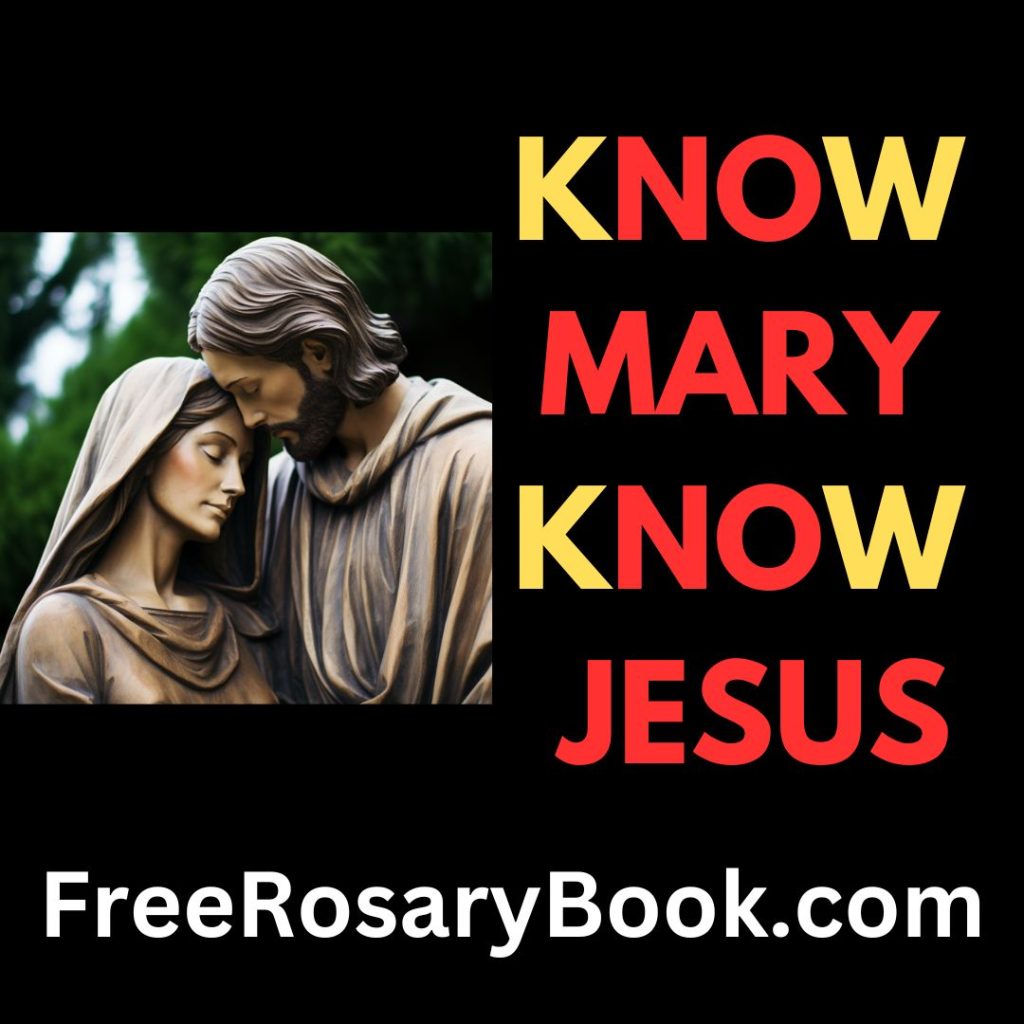
Our Free Rosary Book is designed to be a helpful companion on your spiritual journey, whether you’re just beginning or seeking to enrich your existing practice. It demystifies the Catholic practice of praying the Rosary, addresses common questions, and provides clear, biblically grounded explanations.
But our commitment to your spiritual growth doesn’t stop there. We also offer a range of other free Catholic books that delve into various aspects of Catholic faith and practice. From understanding and defending the Catholic faith, to exploring the differences and misconceptions between Catholicism and Seventh-day Adventism, our books provide in-depth responses to a wide range of topics.
So, whether you’re seeking clarification on a specific issue or looking to deepen your faith, we invite you to explore our resources. Get your free copies today and embark on a path to a deeper understanding of your faith. May the peace of the Lord be with you.
Please consider supporting us with a PayPal donation
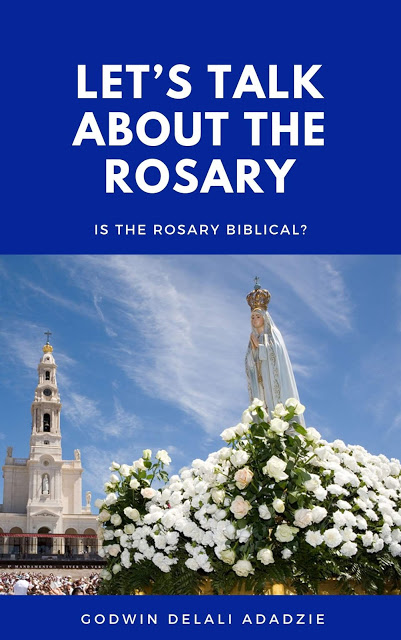
Let’s talk about the Rosary
Is the Rosary Biblical?
“Let’s Talk About the Rosary” by Godwin Delali Adadzie is a comprehensive guide that seeks to demystify the Catholic practice of praying the Rosary. The book addresses common questions and misconceptions about the Rosary, providing clear, biblically grounded explanations.
The book begins by exploring the origins of the Rosary, explaining that it is not derived from paganism but has roots in the early Christian practice of reciting the Psalms. It then addresses the criticism that the Rosary is a form of repetitious prayer, using biblical references to argue that repetition in prayer is not inherently wrong, and that the prayers of the Rosary are not empty phrases but meaningful expressions of love and devotion.
The book also addresses the question of whether the Rosary is more about Mary than Jesus. It argues that the Rosary is Christocentric, focusing on the life, death, and resurrection of Jesus Christ, and that Mary serves as a guide leading us to her Son.
The book then provides a detailed examination of the Hail Mary prayer, showing how each part of the prayer is rooted in the Bible. It also discusses the role of the Saints in intercession, explaining that asking Mary and the Saints to pray for us does not contradict the sole mediatorship of Jesus Christ.
In the final part of the book, Adadzie presents the Mysteries of the Rosary, which are meditations on key events in the lives of Jesus and Mary. These include the Joyful, Luminous, Sorrowful, and Glorious Mysteries, each of which is based on biblical narratives.
In summary, “Let’s Talk About the Rosary” is a valuable resource for anyone seeking to understand the significance and practice of the Rosary in the Catholic faith. It provides clear, scripturally grounded explanations and addresses common criticisms and misconceptions. The book emphasizes the Christocentric nature of the Rosary and the role of Mary and the Saints as intercessors.
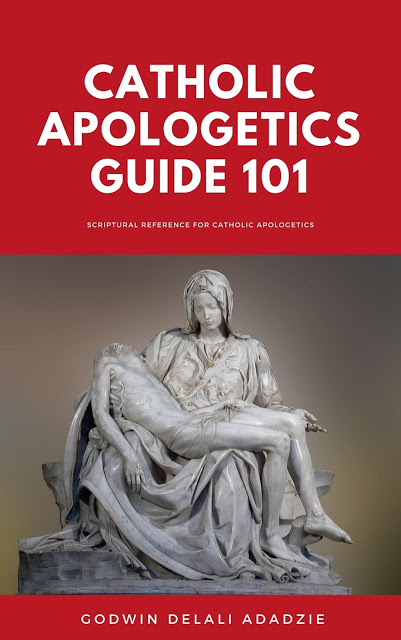
Catholic Apologetics Guide 101
Scriptural Reference for Catholic Apologetics
“Catholic Apologetics Guide 101” by Godwin Delali Adadzie is a comprehensive guide to understanding and defending the Catholic faith from a scriptural perspective. The book is designed to be accessible to both Catholics and non-Catholics, and it aims to clarify misconceptions and misunderstandings about Catholic teachings.
The book begins with a preface that emphasizes the importance of understanding one’s faith and the role of apologetics in defending and explaining it. It acknowledges that many Catholics leave the Church due to a lack of understanding of their faith and the influence of anti-Catholic groups. The book aims to address these issues by providing a clear and concise explanation of Catholic beliefs.
The book covers a wide range of topics, including the doctrines of Sola Fide (Faith alone) and Sola Scriptura (Bible Alone), the sacraments of Baptism, Holy Eucharist, Confirmation, and Penance, the concepts of Purgatory and the Papacy, and the role of Mother Mary and the Saints. Each topic is explored in depth, with references to relevant biblical verses and explanations of how these teachings align with Catholic theology.
The book also addresses common anti-Catholic polemics and bigotry, providing responses based on scripture and Catholic teaching. It includes a Catholic Concordance, which is a list of biblical verses that support Catholic doctrines.
In summary, “Catholic Apologetics Guide 101” is a valuable resource for anyone seeking to understand or defend the Catholic faith. It provides clear, scripturally grounded explanations of Catholic doctrines and responds to common criticisms and misconceptions. The book emphasizes the importance of understanding one’s faith and the role of the Church in guiding and nurturing this faith.
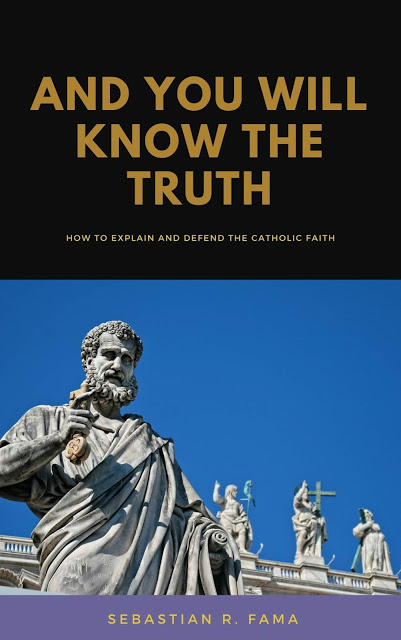
And You Will Know The Truth
How to Explain and Defend The Catholic Faith
“And You Will Know The Truth: How to Explain and Defend The Catholic Faith” by Sebastian R. Fama is a comprehensive guide that aims to provide a robust defense of Catholicism against common objections and misconceptions. The book is structured as a series of essays, each tackling a specific topic related to Catholic faith and doctrine.
The book begins by addressing the debate between Creationism and Evolution, providing a nuanced perspective that reconciles faith with scientific understanding. It then delves into various aspects of Catholic theology, including the concept of the Trinity, the role of the Bible and the Church, the authority of the Pope, and the doctrine of Papal Infallibility.
The book also explores the Canon of Scripture, the role of Tradition, the process of Justification, and the sacraments of Baptism and the Mass. It provides a detailed explanation of the Eucharist and Confession, and addresses doctrines such as Purgatory, Indulgences, and the veneration of saints.
Fama also tackles various Marian doctrines, including Mary’s perpetual virginity, the Immaculate Conception, and the Assumption. He discusses the role of the Rosary, the use of statues and holy pictures, and the significance of scapulars, medals, and relics.
The book also addresses controversial topics such as the prohibition of calling priests ‘Father’, the concept of the Rapture, the practice of abstinence, the Church’s stance on contraception, natural family planning, marriage, divorce, and remarriage, and the process of annulment.
Fama also discusses the Church’s position on abortion, the ordination of women, the words of consecration in the Mass, and the possibility of salvation outside the Church. He also provides a critique of various religious movements and sects, including Jehovah’s Witnesses, Seventh Day Adventists, and Mormons.
The book concludes with a discussion on the debt owed to the Catholic Church and the importance of knowledge in faith. It includes a Doctrinal Concordance of the Bible and an introduction to the Early Church Fathers.
In summary, “And You Will Know The Truth” is a comprehensive guide to understanding and defending the Catholic faith. It provides clear explanations of Catholic doctrines and practices, addresses common objections and misconceptions, and offers a robust defense of the faith based on Scripture, Tradition, and reason.
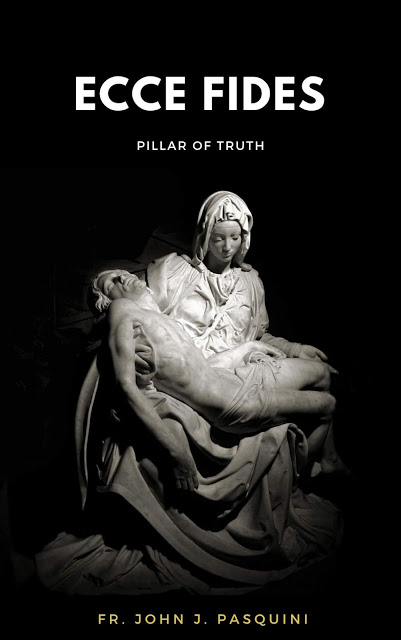
Ecce Fides
Pillar of Truth
“Ecce Fides: Pillar of Truth” by Fr. John J. Pasquini is a comprehensive guide to Catholic beliefs, aimed at reaffirming Catholics in their faith and bringing back those who have strayed. The book is divided into several chapters, each focusing on a different aspect of Catholic theology and practice.
The first chapter discusses the Holy Scriptures and Tradition, questioning where the Bible came from and why it is considered the Word of God. It emphasizes the role of the Catholic Church in determining the canon of the Bible and interpreting its teachings.
The second chapter focuses on the Church, exploring its origins, the role of the Pope, and the importance of apostolic succession. It also delves into the birth of Protestantism and the confusion in belief among Protestants.
The third chapter discusses Sacraments, explaining their significance and the Catholic understanding of being “born again”. It also covers topics like the Eucharist, the Mass, the concept of mortal and venial sins, and the role of priests.
Subsequent chapters delve into the Trinity, the Communion of Saints, Mary, end-time issues, salvation, and various miscellaneous issues. The book also discusses the religion of secularism and moral doctrines under attack.
In the concluding remarks, the author emphasizes that there are no new questions and that the future of Christianity continues to move forward. The book also includes an appendix with an Apologetics Debate Handbook.
This book is a valuable resource for anyone seeking to deepen their understanding of Catholic theology and practice, and it serves as a robust defense of Catholic beliefs through reason, Scripture, and the life of the Holy Spirit.
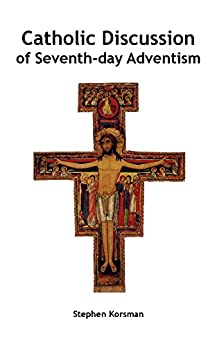
Catholic Discussion of Seventh-day Adventism
“Catholic Discussion of Seventh-day Adventism” by Stephen Korsman is a comprehensive exploration of the differences and misconceptions between Catholicism and Seventh-day Adventism. The book is divided into several sections, each focusing on a different aspect of the two faiths.
In the first section, “What Catholics Believe,” Korsman provides an overview of Catholic doctrines and beliefs, with a particular focus on Sunday observance. He explains that while the Jewish Sabbath is on Saturday, Christians, including Catholics, observe Sunday as a special day because it is the day Jesus rose from the dead. He also addresses common objections and misunderstandings about this practice.
The second section delves into the concept of the Sabbath from both the Old and New Testament perspectives. Korsman discusses various passages from the Bible that pertain to the Sabbath and its observance, and he addresses common Adventist interpretations of these passages.
The book also covers topics such as prophecy, dietary laws, the afterlife, and the Virgin Mary. Korsman provides a Catholic perspective on these topics and refutes common Adventist interpretations.
In the final sections, Korsman discusses general articles on Adventism, the Bible, Christian holy days, and defends Catholic teaching. He also includes guest posts on an Adventist blog and general articles defending Catholic teaching.
Overall, the book serves as a comprehensive guide for anyone seeking to understand the differences and similarities between Catholicism and Seventh-day Adventism. It provides a thorough examination of the doctrines and beliefs of both faiths, making it a valuable resource for both Catholics and Adventists, as well as anyone interested in comparative religious studies.
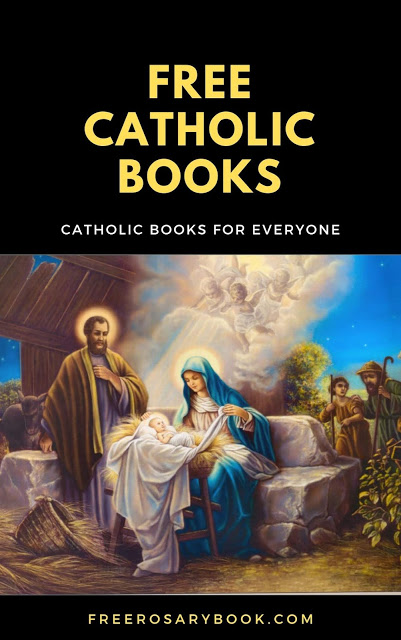
Are you looking for reliable, Catholic answers to your questions? Look no further! Our FREE Catholic Books offer in-depth responses to a wide range of topics, including doctrine, spirituality, and daily life.
With our books, you’ll have access to the wisdom of the Church and the guidance of the saints at your fingertips. Whether you’re seeking clarification on a specific issue or looking to deepen your faith, our books have something for everyone.
But don’t just take our word for it – see for yourself the value of our FREE Catholic Books. Get your copies today and start on the path to a deeper understanding of your faith.

